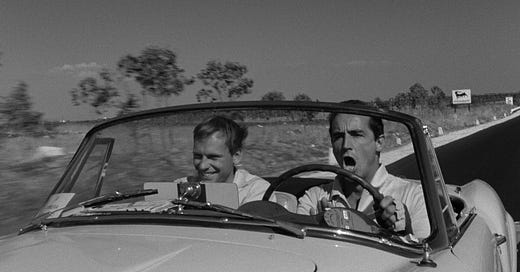
Il Sorpasso (1962, directed by Dino Risi) is the most Italian movie I’ve seen in a while, by which I mean it’s overflowing with a certain kind of idealized ebullient pastoral Italianness. But it also feels like it could have been made in any country, in any decade, because the basic story belongs to Movieland: it’s a road-trip buddy comedy.
From this, you can guess quite a bit. There are two people in the car: one of them is exuberant and fun-loving, the other nervous and uptight. They go on a series of picaresque adventures and encounter various quirky characters. There may or may not be some kind of overhanging menace. The uptight character will learn to loosen up and have fun, but there will also be a down-mood interlude where the freewheeling character reveals a vulnerable side or an unhappy past. The trip will last longer than intended, there will be trouble along the way, and the pair may or may not reach their intended destination.
Il Sorpasso conforms to all of these. The uptight one, Roberto, is a law student who is spending a holiday weekend studying the legal contractual differences between Null and Void. The other is Bruno, human tornado, who descends upon his life like a capricious god from ancient mythology, the kind whose enjoyment derives from stirring up the lives of mortals before disappearing back up into the mountains.
The first scene, when they meet as strangers, reveals everything about who they are. Bruno asks Alberto to make a phone call on his behalf — he’s an hour late for lunch with friends. Alberto, too shy to phone up a stranger, invites Bruno inside to make the call himself. The latter immediately starts messing things up: disarranging his careful stack of notes, getting grease on his furniture, and inadvertently insulting his mother. When invited to use the bathroom to wash up, he disrobes, sends the contents of a shelf crashing to the floor, and sings loudly in the shower. Alberto wants to get rid of him but, when Bruno invites him out for lunch, he’s too afraid of seeming impolite to say no. With the local places closed for the holiday, he soon finds himself being whisked far away from home, a passenger in a car driven with terrifying recklessness. Bruno is fond of the sorpasso — literally meaning overtaking, or surpassing. The surface meaning here is about driving: passing a slower driver by coming up behind them and then temporarily swerving into the opposite lane of traffic to get around them. The figurative meanings in the context of the story, of course, are legion.
Bruno loves to honk his horn (which plays a kind of jazzy tune), shout things at passersby, and overtake multiple cars at once. He also never stops talking (or singing) and flirts with every woman he sees, taking rejection cheerfully. It’s a testament to Vittorio Gassman’s performance that we as viewers can stand his company for more than five minutes. But, as Alberto finds, it’s impossible not to like Bruno, who is jovial and entertaining and possesses the natural charisma of someone who fears neither death nor embarrassment. He’s forever in motion: we get the impression that if he were to stand still for more than a moment, he’d dissolve into the air. Like a creature from myth, he seems to have neither past nor future, but he is also very much of the world, comfortable everywhere, making friends and breaking laws wherever he goes.
I know firsthand how the life of a shy and uptight person can be transformed by a popular, charismatic friend who can act as a guide, who fearlessly enters intimidating places and talks to unapproachable people. And melancholy Alberto gradually finds himself transformed, questioning his perceptions of himself, his approach to life, and his plans for the future.
It seems that there can be no such transformation for Bruno: he simply is.
The underlying subject of Il Sorpasso seems to be happiness itself. What it’s made of, how to get it, what relationship it has to the experiences of joy and pleasure and fun, whether family and stability are an asset or an impediment. As a movie it’s joyful and entertaining — a celebration of life! — but with a darkness that slowly, subtly seeps in at the edges, along with a slow mounting of spiritual exhaustion. Late in the movie, we learn that Bruno rarely keeps friends longer than a day or two. He’s full of life, seems to be made of life itself, but he’s also living a kind of Nietzchean eternal recurrence, in a way always dying, always already dead. Alberto, on the other hand, thinks his life might finally be beginning.
You can watch it on the Criterion Channel or rent it from Amazon or Apple TV. After you watch it, read this piece on it in the Gagosian Quarterly (contains significant plot spoilers) by Carlos Valladares.



A fantastic, underrated film.
spoiler alert!
I wasn't ready for the ending. Then, T.E. Lawrence popped into my head because of the ending, and a little bit because of the year the movies were made.